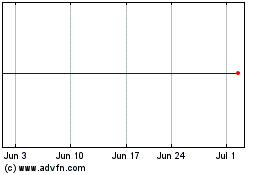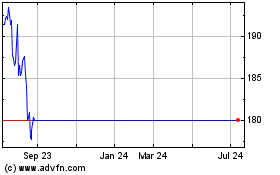By Sharon Terlep and Laura Stevens
Amazon.com Inc. is buying online pharmacy PillPack Inc. giving
the e-commerce giant the ability to ship prescriptions around the
country, and overnight, making it a direct threat to the more than
$400 billion pharmacy business.
PillPack presorts medications and ships them to customers' homes
in 49 U.S. states, excluding Hawaii.
Amazon is paying roughly $1 billion in cash for the
five-year-old startup, according to people familiar with the
matter. The online retailer beat out Walmart Inc., which also was
in talks for PillPack, one of the people said. Walmart had no
immediate comment.
The deal for PillPack fires a warning shot to drug chains and
retailers including CVS Health Corp. and Walmart, which have big
pieces of the prescription market. The acquisition means Amazon
doesn't have to build capabilities in-house that current players
have spent years assembling.
Shares of CVS, Walgreens Boots Alliance Inc. and Rite Aid Corp.
tumbled Thursday, and the three companies lost more than $11
billion in market value.
But the health-care market may be more challenging for Amazon to
disrupt than Wall Street thinks. It is highly regulated, and
depends on a complex web of contracts, interconnected data systems
and other relationships with health plans, drug-benefit managers
and other health-care players that Amazon can't afford to alienate
if it wants its pharmacy business to prosper.
Walgreens executives were holding a conference call with
financial analysts when Amazon announced the deal. Walgreens CEO
Stefano Pessina said the company is "not particularly worried"
about the move.
The drugstore chain is "not complacent," Mr. Pessina said, but
"the pharmacy world is much more complex than just delivering
certain pills or packages. I strongly believe that the role of the
physical pharmacy will continue to be very, very important in the
future."
PillPack's specialty -- packaging a month's supply of pills for
chronic-disease patients -- is just a small part of the overall
market and "has never achieved much retail share," Raymond James
& Associates said in a note to investors.
CVS also played down the threat from Amazon's deal, saying it
already offers multi-dose packaging that can be mailed to a
patient's home or local pharmacy for pickup.
"We believe that we are well-positioned in the market and ahead
in this area," a spokesman said. "Keep in mind, that we have not
seen a large shift of patients that are looking for their
medications to be delivered versus coming to a retail
pharmacy."
The news could impact other companies that play important roles
in the drug-supply chain beyond retail pharmacies, including
middlemen such as Express Scripts Holding Co. that oversee
prescription-drug benefits for employers and health insurers, as
well as drug wholesalers such as AmerisourceBergen Corp. Shares of
both companies also retreated.
The acquisition adds to recent moves by Amazon to wade deeper
into health care, from pushing supplies for hospitals to helping
form a nonprofit aimed at addressing rising costs. It is also the
latest move by Amazon into a major new category via acquisition,
following its purchase last year of Whole Foods Market, which
allowed it to buy supply-chain expertise and a physical network of
stores.
Amazon has been debating internally whether to enter the
pharmacy market for years, according to people familiar with its
thinking. It is a natural next step for the online retail giant,
but the industry is complex.
Amazon typically builds most businesses from scratch, choosing
acquisitions for when it thinks a deal will give it a faster road
to entering that market or acquiring needed expertise, according to
people familiar with its thinking. In PillPack's case, it is likely
a combination of both.
Boston-based PillPack, which was started in 2013, has raised
$118 million from venture capitalists including Atlas Venture,
Accel Partners and CRV. Its co-founder and CEO TJ Parker said in
November that it had tens of thousands of customers and was on
track for more than $100 million in annual revenue.
The deal is expected to close during the second half of this
year, the companies said Thursday.
To stave off home-delivery service competition from Amazon and
other rivals, CVS earlier this month struck a deal with the U.S.
Postal Service to pick up prescriptions at CVS stores and bring
them to customers' homes in one or two days. Customers will be
charged $4.99 per delivery, which could include over-the-counter
products such as aspirin or face wash.
CVS's $66 billion bid for insurer Aetna Inc. was in part an
attempt to position the company to better defend against Amazon as
a potential rival.
Drug-benefit managers, such as CVS's Caremark unit, Express
Scripts and UnitedHealth Group Inc.'s OptumRx, have mail-order
pharmacies that ship prescriptions to patients. PillPack works with
all of the major drug-benefit managers, but Amazon's purchase
threatens a powerful new source of competition.
The online retailer's entry could also squeeze another set of
companies that play an important role in the drug-supply chain.
Wholesalers like AmerisourceBergen, McKesson Corp. and Cardinal
Health Inc. buy drugs from their manufacturers and ship the
therapies to pharmacies. Their relatively low margins could be
pressured even further by Amazon.
But Evercore ISI notes that Amazon tends to use secondary
distributors, such as FedEx and UPS, rather than undercut them in
order to extract profit.
In anticipation of the online threat to their businesses, the
drug-supply chain has been moving to consolidate. Express Scripts
agreed to be bought by health insurer Cigna Corp. for $54 billion,
while AmerisourceBergen has discussed a deal with Walgreens, The
Wall Street Journal has reported.
Amazon has had an on-again-off-again interest in health care. In
1999, it bought a 40% stake in Drugstore.com Inc. Drugstore.com
eventually was bought by Walgreens, which said in 2016 it was
shutting down the site to focus on its own digital efforts.
Amazon rattled the health-care market when it announced earlier
this year it was forming a nonprofit venture with JPMorgan Chase
& Co. and Berkshire Hathaway Inc. aimed at reducing the three
companies' health-care costs. The company last week announced its
new CEO.
--Yuliya Chernova and Jonathan D. Rockoff contributed to this
article.
Write to Sharon Terlep at sharon.terlep@wsj.com and Laura
Stevens at laura.stevens@wsj.com
(END) Dow Jones Newswires
June 28, 2018 14:01 ET (18:01 GMT)
Copyright (c) 2018 Dow Jones & Company, Inc.
AmerisourceBergen (NYSE:ABC)
Historical Stock Chart
From Mar 2024 to Apr 2024

AmerisourceBergen (NYSE:ABC)
Historical Stock Chart
From Apr 2023 to Apr 2024
